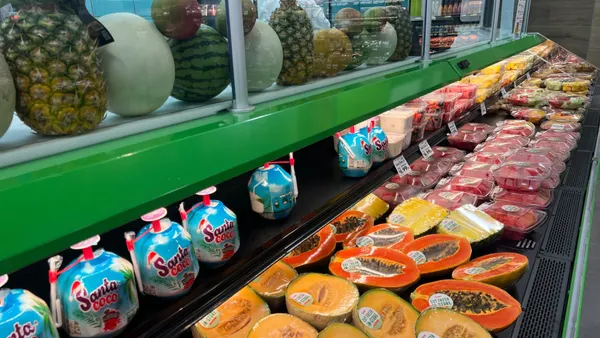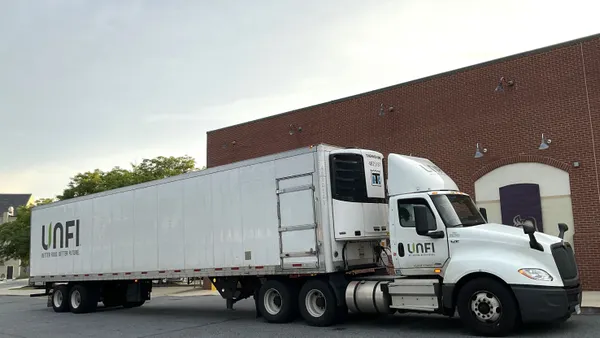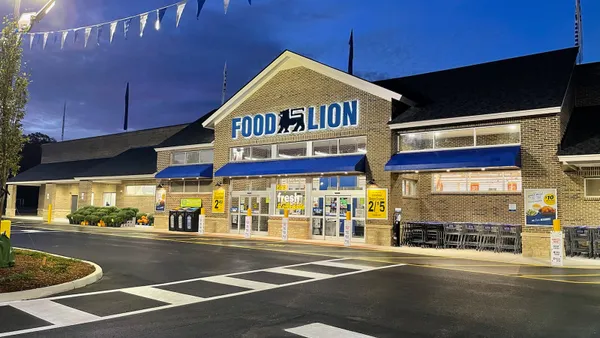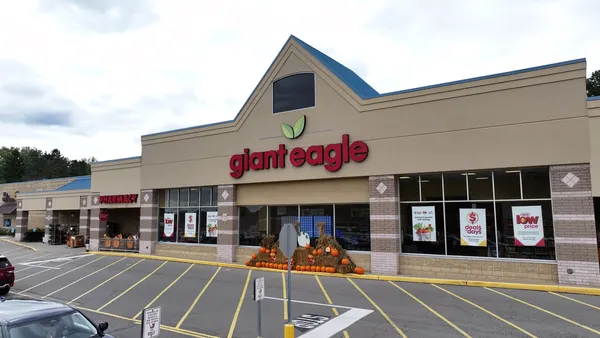Dive Brief:
- Kroger plans to offer grocery delivery service in Louisville, Kentucky, using a "spoke" facility operating in concert with an automated fulfillment center starting later in 2022, the grocer announced in a press release Thursday.
- The 50,000-square-foot facility will transfer orders arriving by truck from Kroger's robot-driven warehouse in Monroe, Ohio, to other vehicles for delivery to customers' homes.
- The addition of the e-commerce center in Louisville continues Kroger's build-out of its grocery e-commerce network in conjunction with U.K.-based Ocado.
Dive Insight:
Kroger's upcoming facility in Louisville will serve as a cross-dock, extending the reach of the company's much larger automated shed in Ohio.
The delivery staging center in Louisville will join a similar Kroger "spoke" facility in Indianapolis in receiving groups of grocery orders assembled at the automated hub and sending them on to individual shoppers.
Kroger may also be looking to use its hub-and-spoke e-commerce approach to extend its reach to Oklahoma City, where it does not currently operate stores, according to The Oklahoman. A building permit indicates the retailer is developing warehouse and office space in the city that could be linked to a customer fulfillment center (CFC) set to open in Dallas, about 200 miles to the south, the newspaper reported.
Kroger has been making steady progress in developing infrastructure to support its efforts to automatically fulfill online orders at centralized facilities designed to serve extensive service areas. The Monroe facility, which opened last spring, became the first operational one in Kroger's growing fleet of robotic picking-and-packing centers across the United States.
In addition to the 375,000-square-foot CFC in Ohio, and similar ones it operates in Groveland, Florida, and the Atlanta area, Kroger is planning to open robotic warehouses in North Carolina, Wisconsin, Maryland, Michigan, California, Texas and other areas of the country.
In addition, the grocer runs "spoke" fulfillment sites in Jacksonville and Tampa, Florida.
The Monroe and Groveland e-commerce depots have both exceeded Kroger's internal projections, company officials said during the grocer's third-quarter earnings call in December.
Kroger's Ocado-built warehouses depend on teams of unmanned vehicles that scurry across a grid to rapidly scoop up items and assemble them for customers. The robots in Monroe, for example, can put together a 50-item order in five minutes and get about 60 individual orders ready for delivery in three minutes, according to Kroger officials.
Ocado said during a presentation on Wednesday it is developing next-generation robots that are lighter than its current equipment as well as enhanced order-routing techniques that will enable grocers to deliver orders even faster. Kroger is examining ways to tap the improvements as its grocery order-handling network grows, Rodney McMullen, the retailer's CEO, said at the media event.











